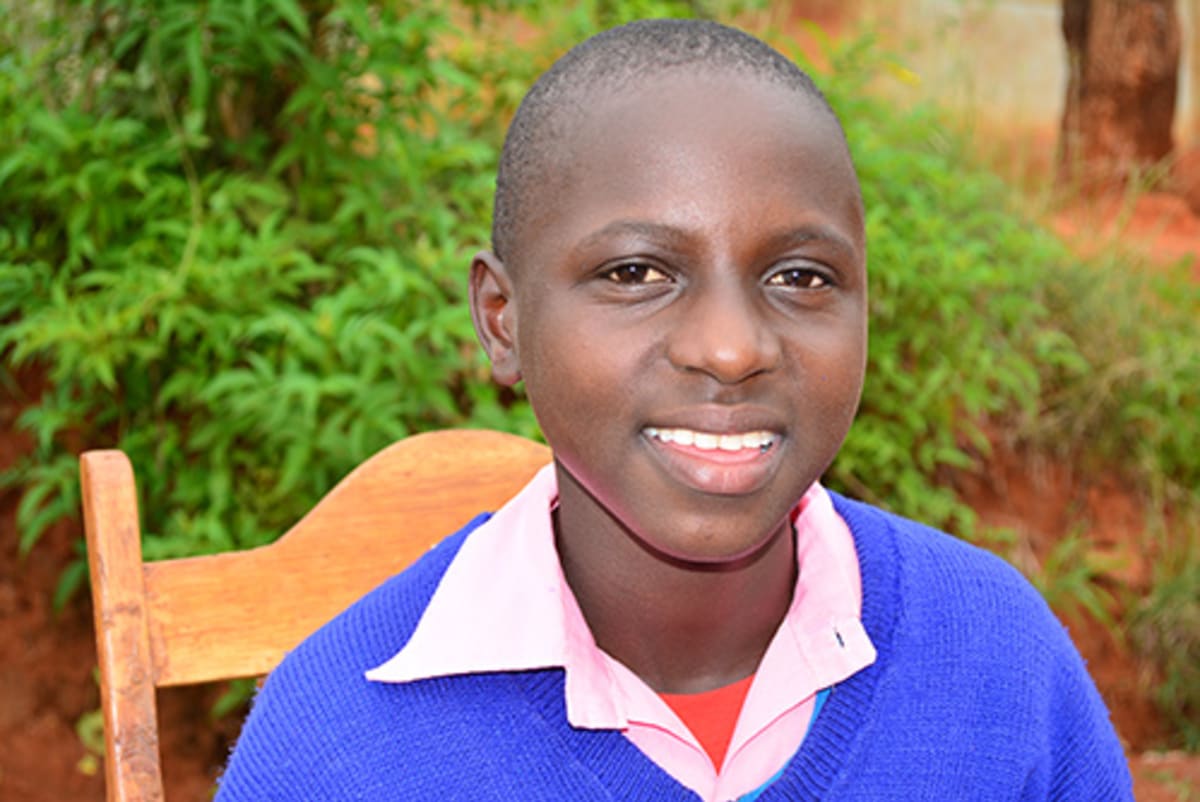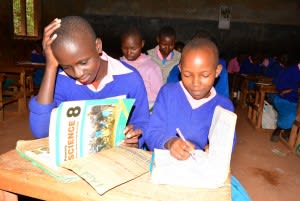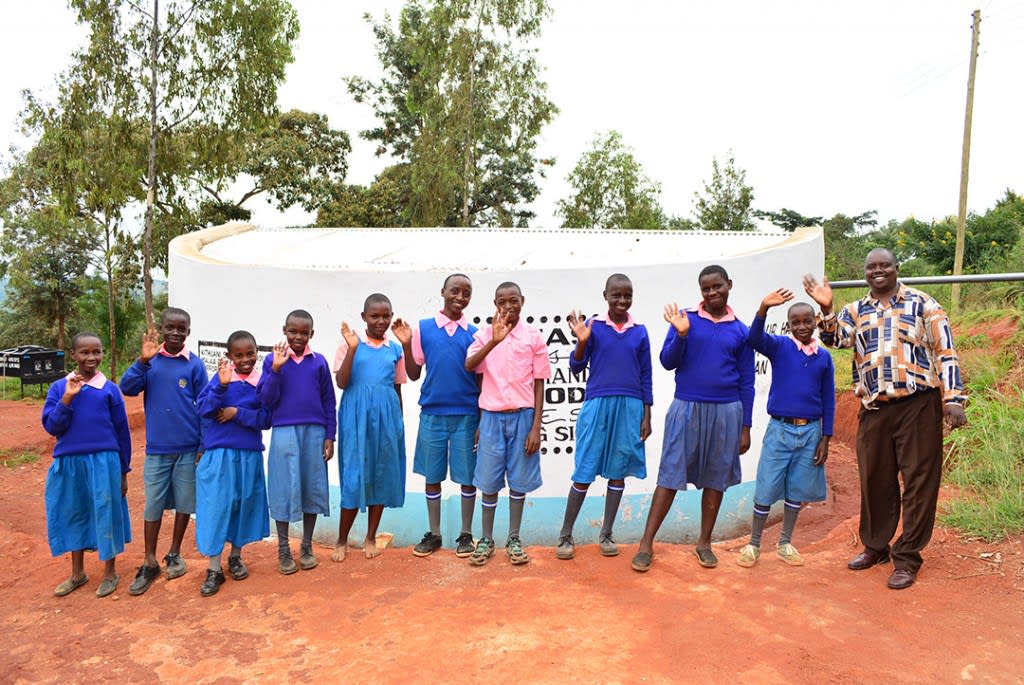This project is a part of our shared program with Africa Sand Dam Foundation (ASDF). Our team is pleased to directly share the below report (edited for clarity, as needed).
Background Information
Malaa Primary School is found in Inguluni village, Yandue Sub-location, Yandue location, Tulimani Division, Mbooni West District of Makueni County. The School was established in 1983.
The school has a total population of 361 pupils (183 boys and 178 girls), 9 teachers (4 males and 5 females) and 2 sub-ordinate staff (a male and a female).
It is closely related with Kithuani Self Help Group which ASDF and The Water Project started supporting in 2014.The SHG comprises of 24 members (17 males and 7 females) who are from 24 households (average household membership in the area is 6 members per household). So far the group has constructed one sand dam with a shallow well.
Water Situation in the School
The school is situated in the semi-arid and arid lands of Makueni County which is characterized by bi-annual rains in November/December (short rains) and March/May (long rains) resulting in long dry spell throughout the year.
On average the school requires 200 liters of water per day, which is used for cooking and drinking.
It is the role of every pupil of Malaa Primary School to carry water every morning to school. Every pupil carries 5-10 liter jerry cans of water. During break time the pupils are sent again to the nearby streams to fetch water.
The current water source for the school is the Kwa Ikombi stream, which is less than 1 kilometer from the school. It takes the pupils 20 minutes to walk to and from collecting water from the stream. At this stream the pupils have to wait for more than 1 hour as this source is shared by the whole village of Inguluni.
The other source is Kwa Philip stream which is less than 1 kilometer as well and it takes the pupils 20 minutes to walk to and from the stream. The pupils have to queue here as well as they wait for their turn to fetch water. Community members meet here as well to fetch water.
The school also has a roof catchment that harvests rain water into two water storage tanks (8,000 and 10,000 liters plastic tanks). These tanks never fill up since the guttering system is poorly fitted and are too small to adequately serve the population of the school when full. The water from these structures lasts for less than two weeks. Additionally the surrounding streams dry up during the dry season.
The current project will improve the schools ability to store rainwater as a larger tank will be added and the gutter systems improved.
Sanitation in the School
Latrines in the school consist of 5 doors for boys, 7 doors for girls, and 2 doors for teachers.
The school has only one hand washing facility which is used by the teachers only.
Water-Related Challenges in the School
The water related challenges outlined below are experienced in the school and especially in the driest months of the year.
- High cases of water borne diseases due to the dirty water that the pupils drink from the stream results in a high rate of absenteeism in the school.
- Wastage of time as pupils rush to the stream to fetch water thus not attending lessons.
- Poor hygiene in the school since the water they carry is not enough to maintain proper hygiene.
- Poor performances of most of the students as lessons are disrupted when the pupils are sent to the stream to collect water.
Project Results:
Rainwater Harvesting Tank
You the donor, TWP, and ASDF supported the school in constructing a 190,000 liter water tank as requested by the Kithuani self-help group. All of the group members are either parents or other relatives who have children attending Malaa Primary School. With the help of the school management committee, the group mobilized parents to collect the required materials such as stone and sand.
Construction of the tank began in early November and lasted until December 12, 2015. Since construction took place during farmers' planting season, the group found it difficult to mobilize the necessary labor for such a large tank. The self-help group eventually found parents willing to help the construction team.
The main challenge during the construction process was the rainy season. Rain flooded the areas sand would normally be collected from, so workers were forced to search elsewhere. Thanks to their ambition, they were able to find other communities willing to help harvest sand.
Hand-Washing Station
The hand-washing stations were delivered on site by December 18, 2015. They will be used to promote hand-washing and teach about the important times to do so. The partner intends these facilities to exemplify what children and families should install and use in their own homes.
A health and sanitation club will be started when students return to school in January. Training sessions will also be held to educate both students and staff.
The Water Project and Malaa Primary School Thank You for unlocking potential!
 Rainwater Catchment
Rainwater Catchment
 Rehabilitation Project
Rehabilitation Project

















 “I no longer carry water to school since we already have a water tank. Before the tank was constructed, we used carry water to school daily. Failure to do so resulted in severe punishment by our teachers. We only depended on a spring and that was always congested all the time because it was shared by the whole village around here. Sometimes, we would be ejected from class to go fetch water. This interrupted our studies and led to poor performance by most of us. One time, my friend Mutheu Mwikali had stomach aches from drinking dirty water and she failed to attend school for several days.”
“I no longer carry water to school since we already have a water tank. Before the tank was constructed, we used carry water to school daily. Failure to do so resulted in severe punishment by our teachers. We only depended on a spring and that was always congested all the time because it was shared by the whole village around here. Sometimes, we would be ejected from class to go fetch water. This interrupted our studies and led to poor performance by most of us. One time, my friend Mutheu Mwikali had stomach aches from drinking dirty water and she failed to attend school for several days.” Like other kids her age, Nduku has big dreams for the future. “When I graduate from primary school, I’d like to join Pangani Girl’s Secondary School in Nairobi. I would love to be an architect when I grow up because I have been inspired by one of our neighbours, a successful architect. Given an opportunity, I would like to live in Algeria because of the conducive climate there.”
Like other kids her age, Nduku has big dreams for the future. “When I graduate from primary school, I’d like to join Pangani Girl’s Secondary School in Nairobi. I would love to be an architect when I grow up because I have been inspired by one of our neighbours, a successful architect. Given an opportunity, I would like to live in Algeria because of the conducive climate there.”
